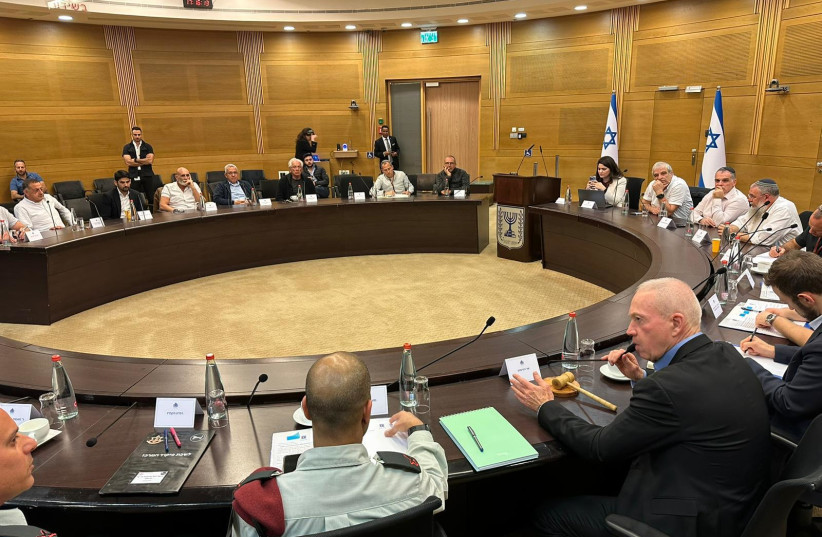Illegal Palestinian and settler building in Area C of the West Bank won't be tolerated, Prime Minister Benjamin Netanyahu said as he continued to set the red lines of his new government when it came to the Israeli-Palestinian conflict.
Prime Minister Benjamin Netanyahu worked Tuesday to quell a coalition crisis as he planned to meet Tuesday, for the second night in a row with Finance Minister Bezalel Smotrich and Defense Minister Yoav Gallant to help clarify who had final authority over civilian life in Judea and Samaria.
Netanyahu, however, has been clear that when it comes to setting policy he is in charge.
On Monday, he told his faction, that Illegal Palestinian and settler building in Area C won't be tolerated.
"We came to power with a clear promise to change direction and to fight against illegal Palestinian construction," Netanyahu told the Likud faction in the Knesset on Monday.
"This does not mean that we will allow illegal Israeli construction," he continued.

He spoke out after the IDF's Friday evacuation of the Or Haim outpost which had been created less than 24 hours earlier created a political crisis within his coalition.
There is "wall-to-wall agreement on these two points," Netanyahu said, adding that heads of the coalition agreed to these principled points in a meeting.
That consensus, he said, "negates the hope of our political opponents that there is [coalition] disintegration here - we are cohesive, strong and united, also in this matter," Netanyahu said.
He spoke out after the IDF's Friday evacuation of the Or Haim outpost which had been created less than 24 hours earlier created a political crisis within his coalition.
There is "wall-to-wall agreement on these two points," Netanyahu said, adding that heads of the coalition agreed to these principled points in a meeting.
That consensus, he said, "negates the hope of our political opponents that there is [coalition] disintegration here - we are cohesive, strong and united, also in this matter," Netanyahu said.
A dispute of power
But his words skipped over the point of dispute, chief among the issue of who controls enforcement action against the outposts.
Smotrich, who heads the Religious Zionist Party would execute that control under the authority of his second position, which is as a minister in the Defense Ministry.
"We came to power with a clear promise to change direction and to fight against illegal Palestinian construction. This does not mean that we will allow illegal Israeli construction."
Prime Minister Benjamin Netanyahu
He ordered the IDF's Civil Administration not to evacuate the outpost on Friday only to have Defense Minister Yoav Gallant override him to raze the outpost's five modular homes.
On Monday he said that all civilian matters in Area C of the West Bank, where all the settlements are located, must be removed from military control and placed under the authority of relevant ministries in Israel, a move that could be viewed as de facto annexation.
Gallant meets with Yesha Council
Defense Minister Yoav Gallant, of Netanyahu's Likud party, said that overall authority for civilian matters including construction issues must remain in his purview.
He expanded on those views when he met Monday with the Yesha Council.

"The battle for the C areas is a central issue," Gallant said. But he clarified that in that area, which is already under IDF military and civilian control, the army is "responsible both on security and on civilian matters."
"We must make sure that we control the situation and control law and order," he said.
Yesha Council head Shlomo Neeman, who also chairs the Gush Etzion Regional Council said that he backed Smotrich's assertion that civilian issues in Area C must be handled by the relevant Israeli government ministries, rather than the army.
"The coalition agreements signed between the parties is an important achievement by the new government. One of the most significant elements of that achievement the reform of the Civil Administration," Neeman said.
"The lives of the Israeli residents in Judea and Samaria must be managed by government ministries as befits a democratic country and not by uniformed officers," he added.
Neeman said that the issue of construction in Area C, which he referred to as Judea and Samaria, was about determining where the country's final borders will be.
The Israeli Right holds that Area C should be part of the country's final borders, while the Palestinian Authority and the international community believe that it should be part of the final borders of a Palestinian state.
Neeman told Gallant that illegal Palestinian building in Area C was part of a move by the PA to seize control of that territory.
He asked him to "prioritize the PA's illegal takeover Area C" adding that "this is a war on the country's borders.'
Neeman also asked Gallant to advance plans for settlement construction."There are thousands of housing units that are awaiting approval. We ask you to continue the development and construction in Judea and Samaria that was halted by the previous government," he said.
On Tuesday the Knesset worked to ensure that settlers living in West Bank settlements would continue to enjoy Israeli residency rights even though they live outside the country's borders.
Special legislation guaranteeing those rights is voted on every five years without much fanfare. Last year right-wing politicians rejected the legislation, as a step toward bringing down the government.
Now that a new right-wing government is in place, it extended those rights for another five years.
